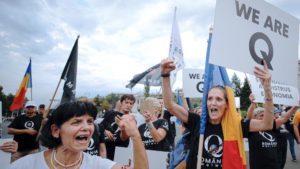 Everything I’ve read about QAnon says it’s a false conspiracy theory, mostly populated by Trump fans. I don’t know any QAnon supporters, and I haven’t met or talked with any, so I don’t have personal knowledge of what they’re thinking, or why they’re thinking it. Here’s what a CNN reporter (read his C.V. here) says about that (here):
Everything I’ve read about QAnon says it’s a false conspiracy theory, mostly populated by Trump fans. I don’t know any QAnon supporters, and I haven’t met or talked with any, so I don’t have personal knowledge of what they’re thinking, or why they’re thinking it. Here’s what a CNN reporter (read his C.V. here) says about that (here):
” … [F]or many of its supporters QAnon is not just a set of conspiracy theories. For them, it’s a way to distract themselves from the failures of a President they see as the hero of a fight against an all-encompassing villainy, to elevate themselves by casting his critics and political opponents as those villains, and to not have to pay attention to all of the US’ very real problems, like Covid-19 and systemic racism.”
It’s also a way to rationalize away their bad behavior:
” … [A] pair of presenters went on a long diatribe against people who wear masks to prevent the spread of Covid-19. It’s a way to control people, and a symbol of submission, they argued.”
The writer talks about “groupthink,” which obviously is going on with these people, and concludes,
“It will be very hard for people who’ve convinced themselves that this is the most important fight of anyone’s life to realize it’s all been a lie,”
which I totally agree with. Vietnam veterans, of whom I am one, went through something of the same thing after sacrificing several years of their lives, risking their lives, and losing buddies in a failed war foisted on them by lying politicians. Been there, done that, so I know how it feels.
A recent article in Psychology Today (read it here) agrees that QAnon feeds psychological needs. These include
“need for uniqueness and needs for certainty, closure, and control that are especially salient during times of crisis. Conspiracy theories offer answers to questions about events when explanations are lacking … conspiracy theories capture our attention, offer a kind of reassurance that things happen for a reason, and can make believers feel special that they’re privy to secrets to which the rest of us ‘sheeple’ are blind,”
which makes a lot of sense. In addition,
” … QAnon has also been described as ‘an unusually absorbing alternate-reality game’ … an immersive form of entertainment that, like online gaming or gambling, provides an ideal set-up for a kind of compulsive behavior that resembles addiction. The puzzle-solving, role-playing dimension of QAnon acts as another reinforcing intoxicant of sorts, providing believers with an exciting new identity as a ‘Q Patriot.’ Back in the 1980s, parents worried that kids playing Dungeons and Dragons would get so invested in their magical role-playing characters that they might lose touch with the real world. Today, QAnon is a kind of live-action role-playing game in which the conflation of fantasy and reality isn’t so much a risk as a built-in feature.”
Read another take on it here.
I have my own simpler explanation. In the early years of this century, I got in the habit of telling friends and acquaintances that middle-class life in America had become so stressful that I thought Americans were heading for a collective nervous breakdown. That’s how I phrased it.
 Then came the Great Recession, followed by agonizingly slow economic recovery, then — WHAM!!! — Covid-19 lockdowns, furloughs and layoffs, and upending of normal life.
Then came the Great Recession, followed by agonizingly slow economic recovery, then — WHAM!!! — Covid-19 lockdowns, furloughs and layoffs, and upending of normal life.
I expected all that stress to break a lot of people, and it apparently did.
Photos: Collective hysteria